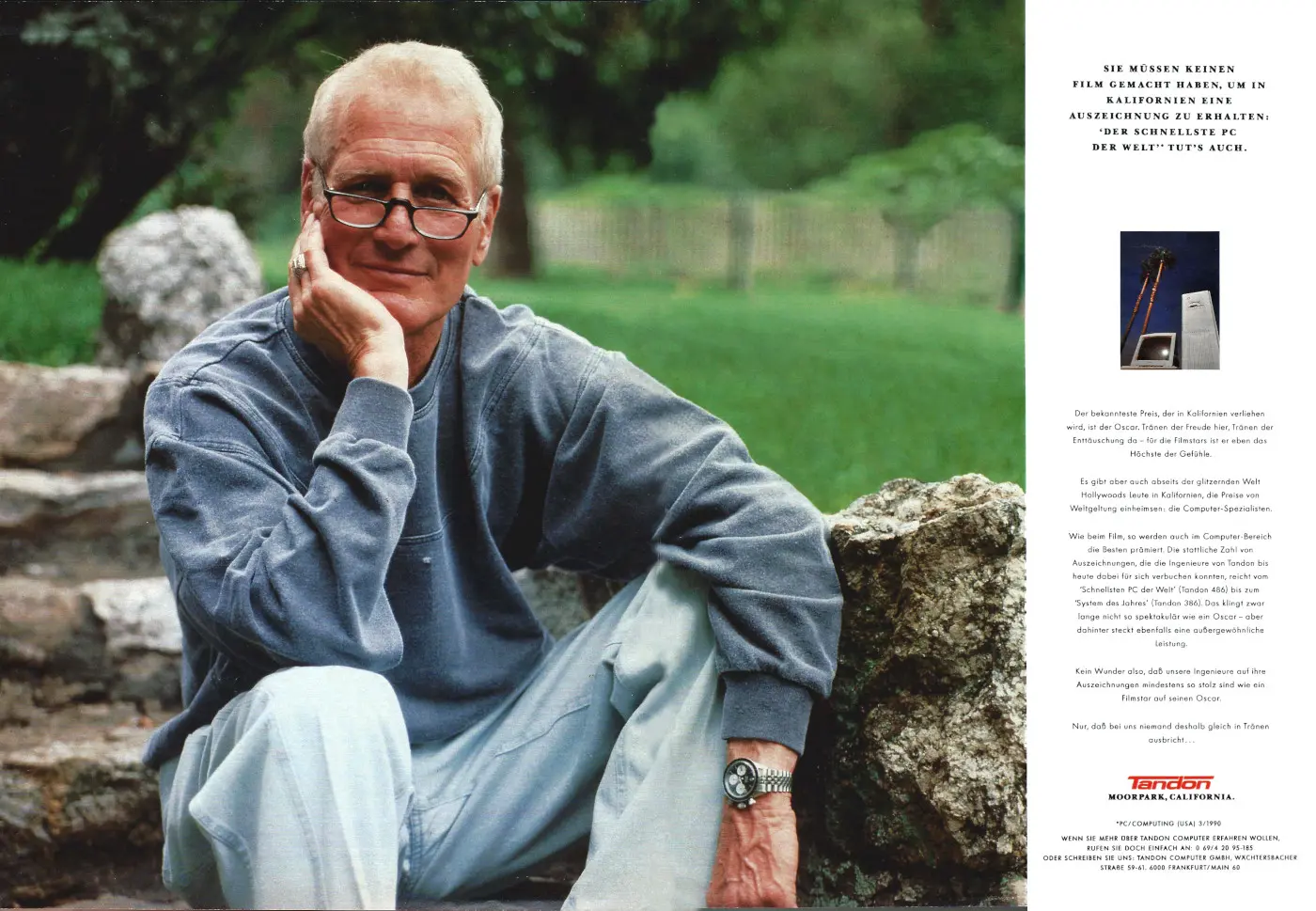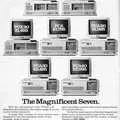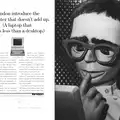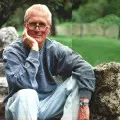Tandon Advert - November 1991
From Der Spiegel

Der Schnellste PC der Welt - Tut's Auch
This advert from German magazine Der Spiegel - which roughly translates as "The fastest PC in the world - that'll do" - continues a frequently-visited meme of microcomputer advertising - that of wheeling in some celebrity with sometimes a tenuous or non-existant connection to micros in order to sell them.
Perhaps some of the most famous examples include William "Captain Kirk" Shatner advertising the "honest-to-goodness" Commodore VIC-20 and, in the UK, Ronnie Barker advertising Commodore PETs.
But there were others, such as Alan Alda of TV's M*A*S*H and US game-show host Henry Morgan, promoting Atari and Commodore respectively, and footballer Bobby Charlton promoting Sharp.
However, this advert certainly raises the celebrity goalposts in its use of world-famous Hollywood legend Paul Newman, although there's no mention of any connection with Newman and Tandon, other than the former is a Hollywood actor and, apparently, the prizes of "fastest PC in the world" (for its 486 machine) and "system of the year" (for its 386), were just like winning an Oscar.
Tandon - one of innumerable IBM PC clone manufacturers - ended up becoming Europe's biggest producer of PC clones for a while, although many of its European models were actually built for it by Daewoo of Korea, at least by the end of the 1980s[1].
It was also something of a destination for employees of other companies, including Chuck Peddle - designer of the legendary 6502 processor and certainly high on the list of candidates to be considered the father of the PC, as he also championed the world's first true PC, the Commodore PET.
Peddle ended up having something of a turbulent time with Commodore, having left the company to join Apple, because he didn't agree with the shift in focus to home computers in the shape of the VIC-20, before returning briefly.
He left again, along with Commodore financier Chris Fish, to start Sirius, which produced a machine - the Sirius 1 - that for a while out sold IBM's PC in Europe, even though it was not even an IBM compatible.
The complex arrangements that Sirius had with its original OEM manufacturer, Victor, which was selling the same machine in the US under its own name as the Victor 9000, eventually turned sour[2] and Peddle moved to Tandon around the beginning of 1985, after Sirius had gone into Chapter 11 bankruptcy protection at the end of 1984.
Peddle stuck around with Tandon for several years, becoming the company's president, but by the late summer of 1988 he was moved sideways to become "adviser and consultant" to the chief executive Sirjang Lal Tandon.
This appeared to be a relief to the staff of Tandon as Peddle had a reputation - not unlike that of Chris Curry of Acorn - of insisting that nothing was done unless he did it himself.
Tandon had been trying to release a pioneering removable hard disk unit, but it had been delayed whilst it was beta-tested to ensure that it really did work with all the 286 and 386 machines on the market - testing that, according to Guy Kewney of Personal Computer World, should have been done the year before.
It was this sort of delay that prompted Peddle's move away from day-to-day management to the sort of strategic thinking he was considered much better at, although there was some nervousness that Peddle might take it the wrong way, as having started several companies already he might think nothing of jumping ship again to start again[3].
Meanwhile, the project that led to the IBM PC, which eventually swept away Sirius's machine in Europe, had been managed by Bill Sydnes - the first man that William Lowe - father of the IBM PC - had recruited for the company's "skunk works" project at its Entry Level Systems offshoot in Boca Raton, Florida.
Sydnes, who had been at IBM for some 18 years, eventually left Big Blue during the PCjr fiasco and moved to Franklin, a company famous for its illegal clone of Apple's Apple II machine.
When Franklin declared bankruptcy, Sydnes, along with Dan Wilkie and HL Sparky Sparks - also from IBM's Boca Raton PC team - ended up at Tandon[4], surely completing some sort of golden circle, not least as it involved the two most cloned machines of all time - the IBM PC, and to a lesser extent the Apple II.
Dan Wilkie, in particular, was said to have been one of the most important members of the Tandon-IBM connection, and had been hired directly by Tandon's founder in order to help capture the PC market in the US.
However, the company was slow to establish itself on IBM's home turf, and within a couple of years Wilkie resigned from the company despite a four-year contract worth $1.2 million.
Somewhat ironically, given the reason for Peddle's move sideways, it was said to have been Sirjang Tandon's unwillingness to "relinquish day-to-day control of his company" as well as disagreements on expenses and the direction of its sales strategy that led to Wilkie's departure, although he did last longer than Sparks and Sydnes, who left within a year of joining[5].
Also to be found at Tandon was former Apricot managing director Ed Sherman.
Sherman had previously been the MD of Apricot's microcomputer division before being installed as head of dealer and customer relations at the troubled company following a run on its shares in 1989[6].
Apricot was once thought to be a serious world contender but had collapsed once already in 1986.
Date created: 15 January 2020
Last updated: 23 April 2025
Hint: use left and right cursor keys to navigate between adverts.
Sources
Text and otherwise-uncredited photos © nosher.net 2026. Dollar/GBP conversions, where used, assume $1.50 to £1. "Now" prices are calculated dynamically using average RPI per year.


